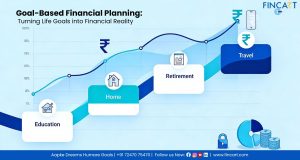Table of Contents
ToggleThe New Year is here! It’s a good time to contemplate the past and look forward to the future. When people make their New Year’s resolutions, most of them tend to be related to physical or mental fitness – building good habits and ditching the not-so-great ones. One aspect that can get overlooked is financial fitness. Just like you commit to being physically healthy, you have to commit to being financially healthy. A fit body is not just a result of a few pushups, rather it demands discipline and dedication. Similarly, your financial health demands a conscious effort and commitment to making positive changes in your financial life.
A financially fit person stays on top of their Financial Planning, makes informed and confident decisions about their money, and stays on track to achieve their financial goals. The New Year brings you the perfect opportunity to build a positive and strong money mindset, and in this blog, we’ll take a look at ways in which you can improve your financial fitness.
Assessing Your Current Financial Situation
Step one is to understand and assess your current financial standing. Take a close look at your income, and note down all its sources, primary and secondary to know what’s coming in. Now list down what’s going out – your expenses, and your liabilities such as credit card loans or education loans. Note down all your assets, such as your properties, cars, investments, deposits, and so on. With these components you will be able to know your net worth – just subtract your total liabilities from your total assets.
To improve your net worth, you have to either increase the value of your assets or reduce your liabilities. Net worth is a good metric to assess your financial health, so don’t hesitate to seek Financial Advice on calculating and improving it. Once you have the full picture of your finances, you’ve laid the foundation for effective financial planning.
Setting Clear Financial Goals
Now that you have a clear picture of your financial standing, the next step is goal setting. An important thing to keep in mind when goal planning is to make sure the goals are realistic and attainable. If you set an unrealistic goal, you might be setting yourself up for failure. This isn’t to say you shouldn’t be ambitious, but rather it’s essential to strike a balance between ambition and achievability. Ambitious goals can be motivating, but setting goals that are too far-reaching can lead to frustration and some not so wise decisions. Instead, try to set goals that challenge you without overwhelming your resources or timeline.
Your goals should be specific and clear too. If your goal is to “invest for a peaceful retirement”, try something more specific like “investing Rs. 50 thousand per year to have my desired retirement amount in 35 years.” This specificity not only gives you a clear target but also allows you to track your progress more effectively so you can make necessary adjustments along the way.
Creating a Realistic Budget
Budgeting in Financial Management is the process of creating a framework that outlines all your expenditures. This framework has to reflect your goals. Start by classifying your total expenses into three categories – essential, non-essential, and savings. When you receive your income, prioritise spending on necessities and allocate funds to savings before addressing the non-essential expenses. This disciplined approach helps make sure that savings take precedence. If you have any debts, prioritise paying them off too. The non-essential category will help you find areas where you can make cutbacks. Like goals, your budget should also be realistic. The biggest reason why budgets fail is simply because people stop following them.
If you want to stick to your budget, don’t be too rigid, and don’t make too many cuts. Leave a little room for fun and make sure your lifestyle doesn’t suffer. Striking a balance is the key to the long-term success of your budget.
Building Emergency Savings
A financially fit person is prepared for any unforeseen financial circumstances and expenses, such as emergency medical bills, loss of employment, costly car repairs, or even national emergencies like Financial Risks in Governments. Having an emergency fund can not only save you from these unpredictable financial expenses but also provide you with peace of mind. Generally, one should aim to have three to six months’ worth of living expenses saved in a separate and easily accessible account. This however is not set in stone because everyone’s situation is different. Your fund should have enough to sustain your lifestyle till you can bounce back. A financial emergency has the potential to derail your plans significantly so if you don’t have an emergency fund yet, building one can be a great New Year’s resolution.
Investing for the Future
A financially fit person makes their money work for them. Investing is the tool that will help you realise your long-term financial goals. There are many different options for different kinds of investors available so first you have to assess what kind of an investor you are. Do you like a more hands-on approach with your money or are you comfortable letting professionals take control? Are you willing to expose yourself to high risk to gain high rewards or do you want steady, reliable returns? What is your time horizon? What are your goals? Questions like these will help you understand yourself better and enable you to choose the right investment avenues for yourself. Seeking guidance from an investment advisor can be invaluable in this process. An expert investment advisor can help you understand your options better, and give you advice based on your risk appetite and financial goals. With a personalised plan in place, you’ll be better equipped to make informed investment decisions that are aligned with your financial goals.
Developing Financial Literacy
Another important aspect of financial fitness is financial literacy. Financially fit people make informed choices and make use of the best practices when it comes to investing and saving. How do they do this? They do so by constantly educating themselves about the various concepts of finance, and by keeping up with the latest happenings in the financial world. Developing financial literacy is a slow process and can seem intimidating at first, but if you take small, consistent steps it becomes easily manageable. Start by reading articles or listening to podcasts from reliable finance sources. Pick topics that interest you initially, like mutual fund investing or taxes so you can build a habit. Watch the news and stay informed about economic trends. As your knowledge grows, so will your confidence, and you’ll be making well-informed decisions before you know it.
Overcoming Financial Challenges
Challenges and setbacks are an inevitable part of life, and the same holds true for financial journeys. One thing that can weigh you down is dwelling on your old mistakes. When you’re faced with new challenges you might think of old failures, which can cloud your judgement. The first thing to do is to let go of your past mistakes. Take your lessons from them, and move on. When you’re faced with new challenges such as a job loss, or economic downturns, remain positive. Think of them as exactly what they are – temporary hurdles that can be overcome. Adopt a growth mindset, which means believing that challenges are an opportunity for personal growth, and that effort can overcome any setbacks life has to throw your way.
Cultivating a Positive Money Mindset
The importance of having a positive money mindset cannot be overstated. Building a positive attitude towards money is a slow process so start small. Here are some tips to cultivate a positive money mindset:
- Replace negative thoughts with positive ones. Negativity can limit your potential and hinder growth. For example, if you have debt, it’s easy to fall into negative self-talk like “I can’t pay my loans off and because of that I’ll never be able to achieve my goals.” Try being more positive in such a situation by thinking “I have a big debt but I’ll make a repayment plan to pay them off as soon as I possibly can, and achieve financial freedom.”
- Stop comparing yourself to others. As the old saying goes, “Comparison is the thief of joy.” If you compare yourself to others you will feel dissatisfied and unmotivated.
- Look at what you do have and be grateful for it. Make a plan to best utilise your resources.
- Celebrate small financial successes in your day-to-day life, such as some extra savings or sticking to your budget.
- Forgive your past financial mistakes. For example, if you ever lost money while investing in stocks, don’t let that discourage you from investing in stocks altogether. Learn from your mistakes and let go of any guilt and regrets you have.
By taking small steps like these you can build a positive relationship with money.
Monitoring Progress and Adjusting Goals
Another habit of financially fit people is their commitment to regularly monitoring progress towards their goals. This is important because it prevents them from straying off track. These people are flexible with their plans and are quick to adapt to changing circumstances and make adjustments. Regularly review your budget, portfolio, savings goals, and debt repayments. Circumstances change, especially in the world of finance, so it’s important to make the necessary adjustments to your financial plan accordingly. Be flexible and adapt to changing circumstances as you continue progressing towards your long-term goals.
Conclusion:
Achieving financial fitness is a lifelong effort that demands discipline, determination, and patience. The steps we discussed above – knowing your current financial standing, setting realistic goals and budget, building an emergency fund, investing, developing financial literacy, and building a positive money mindset can help you with your financial planning in new year, and help you commit to achieving financial fitness.
Remember the words of famous financial advisor Suze Orman, “No one’s ever achieved financial fitness with a January resolution that’s abandoned by February.” Be persistent, stay committed and you’ll be on your way to building a strong money mindset and securing a brighter financial future.
Wishing you a very Happy New Year!




